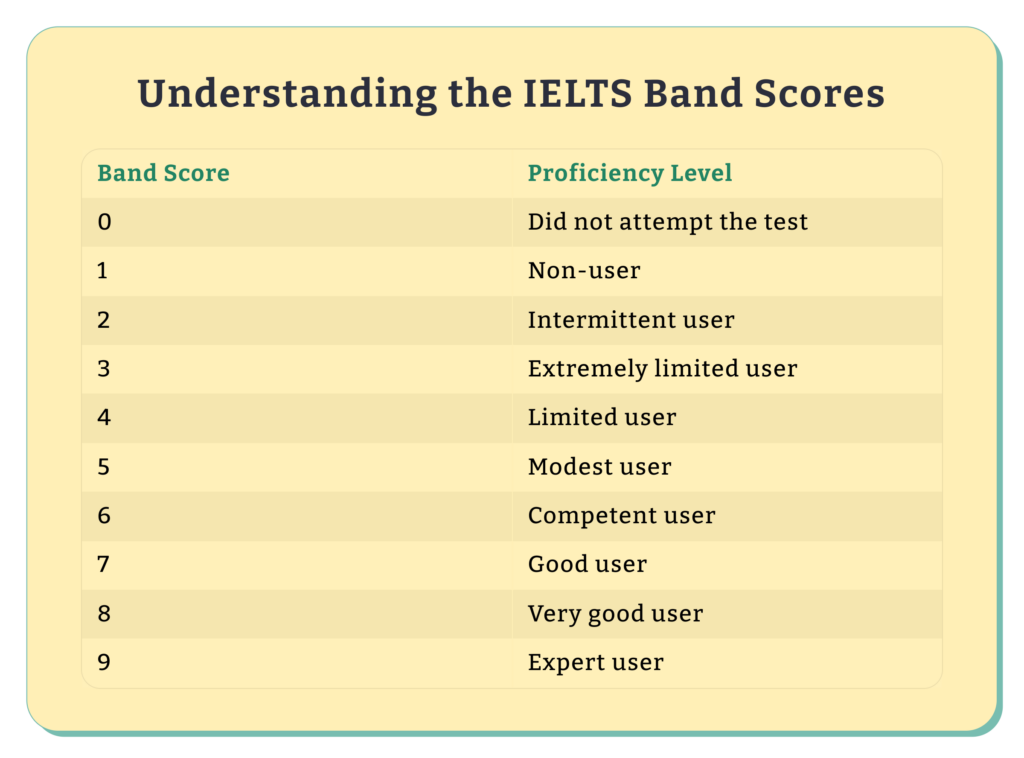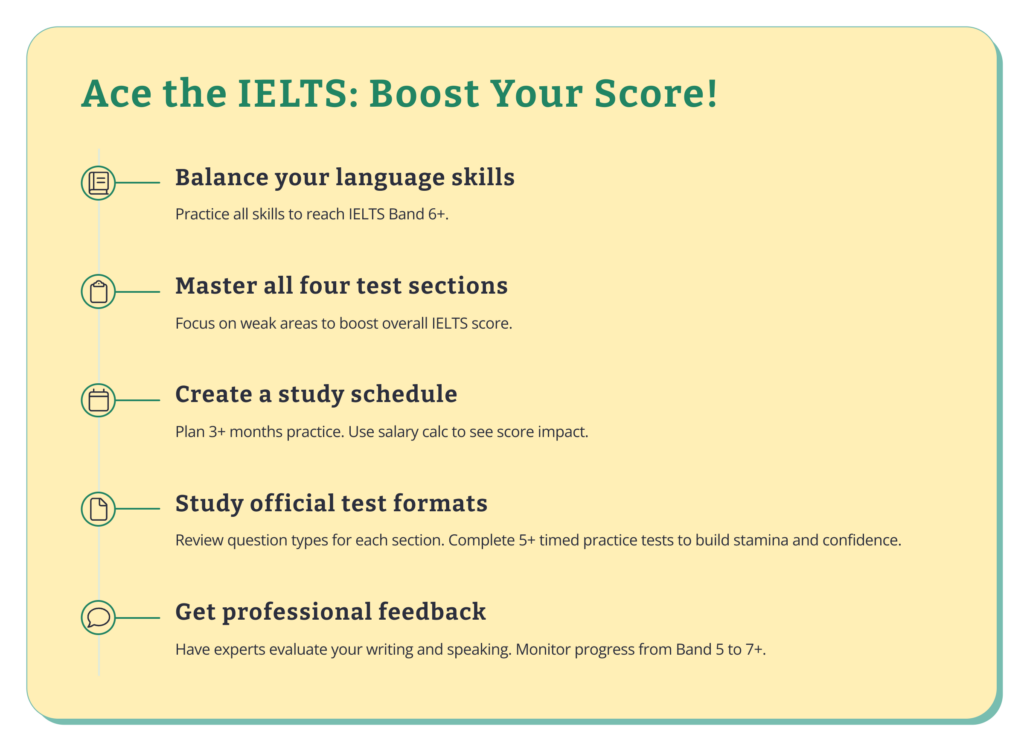

Quick Summary
To successfully study for the IELTS exam at home, consider the following steps: familiarize yourself with the test format, practice each section, improve your English skills, and create a study plan. Use official practice materials, set achievable goals, and seek feedback to assess your progress.
The International English Language Testing System, otherwise known as the IELTS, is a globally accepted test for assessing English-language fluency for people who wish to study, work, or migrate to a country where the main language used is English. It is jointly managed by the British Council, IDP Australia, and Cambridge Assessment and is accepted by over 11,000 institutions worldwide including universities, employers, and immigration authorities.
The test evaluates different communicative skills: listening, speaking, reading, and writing, and gives an overall score as an indication of a candidate´s capacity to communicate effectively in English. The IELTS test is presented in two versions:
It is one of the most trusted English language tests, with a band score ranging from 0 to 9, covering grammatical skills accurate to real-life situations in various communication arenas. It is performed many times a year in 140 countries, and the option to hand it in on paper or computer is available.

You always have this question in your mind how to prepare for IELTS at home? IELTS exam preparation at home can be an effective and convenient way to achieve your desired score. Following certain strategies and utilizing available resources can enhance your skills in all four exam sections – listening, reading, writing, and speaking. Here are some steps you can take to prepare for IELTS at home without coaching:
It is crucial to understand the structure and format of the IELTS exam. Visit the official IELTS website or refer to reputable sources to learn about the test sections, timing, and question types.
Enhancing your vocabulary is essential for the reading and writing sections of the IELTS exam. Remember to note unfamiliar words and their meanings and regularly revise them to reinforce your knowledge. Additionally, using vocabulary-building resources like flashcards or vocabulary apps is the best way to prepare for IELTS at home.
Example: Assume you’re reading an article about climate change. You come across the word “mitigate” and learn that it means to reduce the severity or impact of something. You add it to your vocabulary list and practice using it in sentences or conversations.
Thinking about how to prepare for IELTS at home and then taking the IELTS practice test is right, as it helps familiarize yourself with the exam’s timing, question types, and difficulty level. Look for official IELTS practice tests available online or in IELTS preparation books. Allocate specific times for each section, and try to replicate the test environment as closely as possible. Analyze your performance to identify areas of improvement and focus on those in your subsequent practice sessions.
To enhance your listening skills:
Example:
Improving your speaking skills requires regular practice. Find a language exchange partner or join online speaking groups to engage in conversations. Practice speaking on topics, express your opinions, and maintain fluency and coherence. Record yourself speaking and analyze your performance to identify areas for improvement, such as pronunciation or grammar.
Example: Choose a topic, such as “advantages and disadvantages of social media.” Prepare some key points and then have a discussion with a language partner or record yourself giving a short presentation on the topic.
Read more: How to Be an Effective Communicator in 5 Easy Steps
Enhancing your writing skills involves practising different types of essays, letters, and reports. Start by analyzing sample IELTS writing tasks and their model answers to understand the structure and requirements. Practice writing within the given time limits, paying attention to coherence, grammar, vocabulary, and overall organization. Seek feedback from experienced IELTS tutors or join online writing communities for constructive criticism.
Example: Take an IELTS writing task 2 question, such as “Discuss the advantages and disadvantages of globalization.” Plan and write a well-structured essay within the time limit. Focus on presenting arguments, providing examples, and expressing your opinions clearly.
Your IELTS results are expressed as band scores, ranging from 0 (lowest) to 9 (highest). Each band reflects your English competence. You’ll receive:
Scores are reported in whole and half bands (e.g., 5.0, 7.5). Familiarizing yourself with the marking criteria is essential for effective preparation.
Evaluate your skills in Listening, Reading, Writing, and Speaking. Identify your strengths and weaknesses to shape your study plan.
Self-study is crucial for preparing for the IELTS exam at home. Here’s how to make the most of it:
These habits can significantly enhance your English skills and boost your confidence for the exam.
The International English Language Testing System is a widely recognized English language proficiency exam. You will learn in this section about the format of the IELTS exam. Not only that, you will learn how to prepare for IELTS at home without coaching. It is mainly for individuals who wish to study or immigrate to English-speaking countries. The exam assesses the test takers’ abilities in the four language skills: Listening, Reading, Writing, and Speaking. Understanding the format of the IELTS exam is crucial for effective preparation.
| Section | Duration | Format | Question Types | Tips |
|---|---|---|---|---|
| Listening | Approximately 30 mins | Four recordings of native English speakers; answer questions based on the recordings. | Multiple-choice, matching, labelling diagrams/maps, completion tasks | Practice active listening, take notes, and familiarize yourself with different accents. |
| Reading | 60 mins | Three long reading passages with increasing difficulty; answer questions based on the passages. | Multiple-choice, matching, True/False/Not Given, sentence and summary completion | Improve reading speed, practice skimming/scanning, and enhance vocabulary. |
| Writing | 60 mins | Two tasks: Task 1 (150 words) and Task 2 (250 words). | Task 1: Describe visuals/processes; Task 2: Write an essay | Learn essay structures, manage time effectively, and proofread for errors. |
| Speaking | 11-14 mins | Face-to-face interview with an examiner. | Part 1: Introductory questions; Part 2: Speak on a topic; Part 3: Follow-up discussion | Practice speaking on various topics and engage in discussions. |
Tips: Practice speaking fluently, express ideas clearly, work on pronunciation and intonation, and expand your vocabulary.

The IELTS score is reported on a scale of 0 to 9, known as the IELTS Band Score. Each section (Listening, Reading, Writing, and Speaking) receives a band score. An overall band score is calculated as the average of the four sections. The scores indicate the test taker’s English language proficiency level.
It is important to understand that different institutions or immigration authorities may have specific score requirements, so check the requirements of your target institution or organization. Generally, a band score of 6.5 or 7 is considered good for most academic and professional purposes.
Remember that the IELTS score is valid for two years from the test date. So, preparing effectively and performing well in the exam is crucial to achieving your desired score.

Understanding IELTS Band Scores
Interpreting Your Scores
Score Validity
The IELTS test exists in two formats: Academic IELTS for students aiming to enrol in universities and for professional registration, and General IELTS for migration or work purposes. The test can be taken in either a computer-based or a paper-based format at official test centres and also retake just one section (Listening, Reading, Writing, or Speaking). Additionally, IELTS Academic test-takers can take the IELTS Online test at specified venues.
In IELTS on Paper, you would take your test in a traditional format – at a desk, with question papers and answer sheets for Reading, Listening and Writing tests in an official IELTS test centre. You would have to write down the answers in black ink ballpoint pen only. No other colour pen or pencil allowed. The speaking test will be one-on-one with a certified IELTS examiner.
Results will be made available within 7 calendar days from the date of the test.
The IELTS paper-based test occurs in India four times per month or, broadly speaking, 48 times a year. Usually conducted on Saturdays and Thursdays, test-taking candidates are offered the flexibility and convenience of choosing a date of their liking.
The IELTS on Computer test is a digital version of the test, administered at a test centre. The Listening, Reading, and Writing sections of the exam are to be completed on a computer, while the Speaking part shall be face-to-face with an examiner or through a video call.
Results are available within 3 to 5 days after the test date.
Key Features:
IELTS One Skill Retake allows a candidate to retake only one section of the test (Listening, Reading, Writing, or Speaking). This would be beneficial for the candidates since he or she can improve in one of the four skills without undergoing the entire test again.
Key Features:

Preparing for the IELTS exam requires access to quality study materials and resources. Here’s a list of recommended IELTS preparation materials and books that can help you effectively prepare for the test:
How to prepare for IELTS at home for free? Preparing for the IELTS exam at home can be a convenient and effective way to study. To help you in your preparation, here are some of the best ways to prepare for IELTS at home :
Remember always to use a variety of resources to get a well-rounded preparation. Practice regularly, simulate exam conditions, and improve your weaker areas.

To sum up, in-house IELTS preparation requires hard work, constancy, and proper resources. Improving English proficiency is possible by following a good study plan with vocabulary enhancement, good practice with mock tests, and working on each of the modules: Listening, Reading, Writing, and Speaking. Use available online resources, find a study partner, and practice under test conditions to gain confidence. Stay focused, set goals, and work on weaker areas. The high IELTS score is attainable with determination and intelligent strategy. Trust yourself, keep going, and it will surely come around.
Evaluate numerous career choices to choose the right career path for yourself. Dive into our guide on Career Advice.

Ans. Some parts of the IELTS exam can be harder for different people because everyone has their strengths and weaknesses. Many students struggle with the Writing section because they have limited time to write good essays with clear ideas. The Speaking section can also be difficult because you have to talk directly to the examiner.
Ans. To increase your chances of passing the IELTS on your first attempt, consider the following strategies:
1. Practice regularly with official IELTS preparation materials and sample tests.
2. Enhance your vocabulary and grammar through extensive reading and writing.
3. Use online resources like websites, apps, and forums for additional practice and tips.
4. Consider enrolling in a reputable IELTS preparation course or working with a tutor to receive expert guidance and feedback.
Ans. The IELTS test is not made harder for students from any specific country, including India. It can be tough because it carefully evaluates how well you know English. However, with a good preparation strategy, practice, and hard work, students from India and anywhere else can get the desired score in the IELTS. It is all about putting in effort and practising to do well.
Ans. The IELTS test results are valid for two years from the test date. After two years, the scores are considered expired. Thus, you must take the test again if you require a valid IELTS score. It’s important to plan accordingly and use your IELTS score within the validity period for your intended applications, such as university admissions or immigration processes.
Ans. You can prepare for IELTS on your own by regularly practising all four sections (reading, writing, speaking, and listening) using official IELTS practice tests, study guides, and other online resources while setting realistic goals and tracking your progress to identify areas for improvement. Consistent hard training has always been a key to success.
Ans. A band 9 score depends entirely on one’s performance in showing a complete and diverse range of vocabulary, together with the adequacy with which these are put to use. Vocabulary must be used flexibly and precisely concerning myriad tasks, for misapplied words can lead to ambiguity or misunderstood contexts.
Ans. Some people may require as little as one month of preparation for their IELTS exam, although the duration is relative to one’s potential proficiency in the English language and the target score.
Ans. Best ways to prepare for the IELTS exam:
1) Do a mock test,
2) Know the test format,
3) Know about the time constraints of the exam,
4) Develop your English skills and IELTS strategies,
5) Listen in English while multitasking,
6) Work on different areas of Reading, and
7) Use suitable and assertive English words while writing.
No, scoring a 7.5 in IELTS is not considered “easy”. You must have a good level of English proficiency.

Authored by, Gagandeep Khokhar
Career Guidance Expert
Gagandeep is a content writer and strategist focused on creating high-performing, SEO-driven content that bridges the gap between learners and institutions. He crafts compelling narratives across blogs, landing pages, and email campaigns to drive engagement and build trust.
Editor's Recommendations
Chegg India does not ask for money to offer any opportunity with the company. We request you to be vigilant before sharing your personal and financial information with any third party. Beware of fraudulent activities claiming affiliation with our company and promising monetary rewards or benefits. Chegg India shall not be responsible for any losses resulting from such activities.
Chegg India does not ask for money to offer any opportunity with the company. We request you to be vigilant before sharing your personal and financial information with any third party. Beware of fraudulent activities claiming affiliation with our company and promising monetary rewards or benefits. Chegg India shall not be responsible for any losses resulting from such activities.